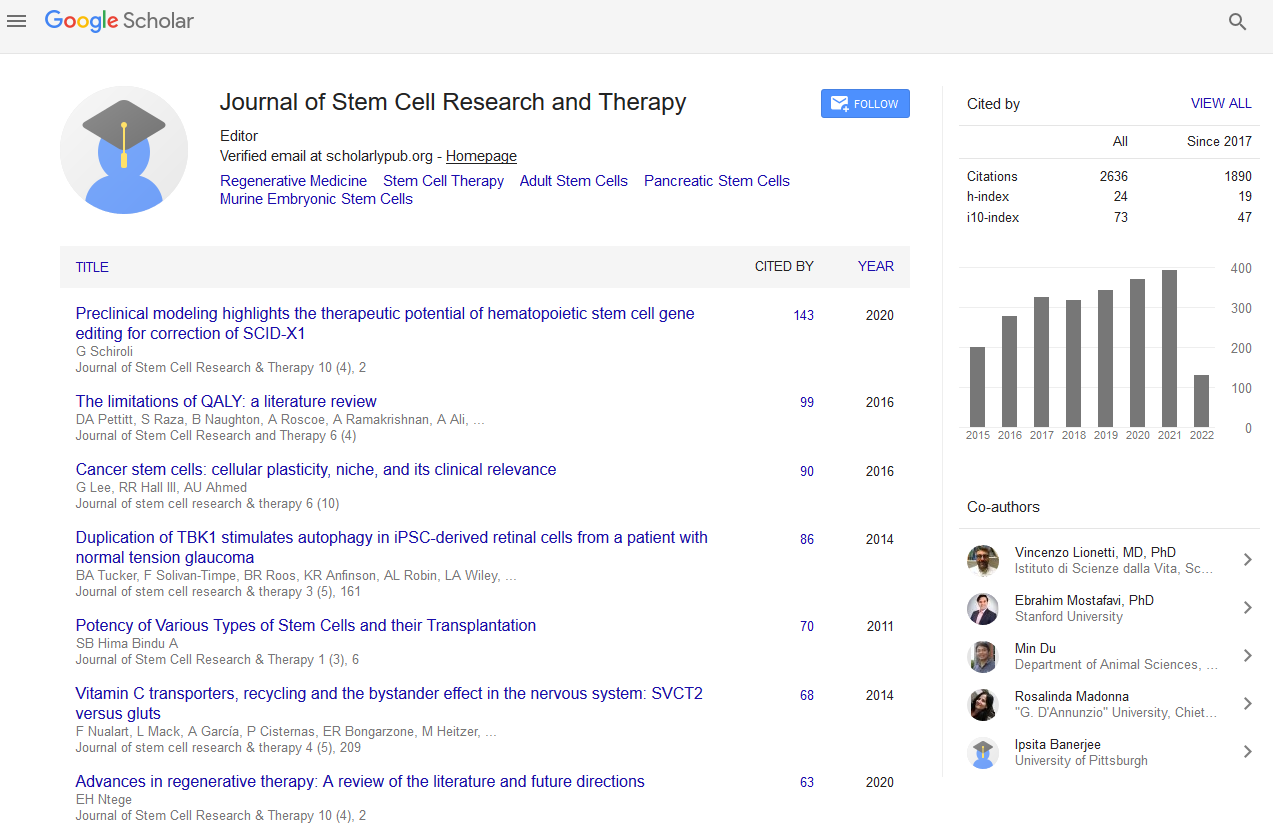Indexed In
- Open J Gate
- Genamics JournalSeek
- Academic Keys
- JournalTOCs
- China National Knowledge Infrastructure (CNKI)
- Ulrich's Periodicals Directory
- RefSeek
- Hamdard University
- EBSCO A-Z
- Directory of Abstract Indexing for Journals
- OCLC- WorldCat
- Publons
- Geneva Foundation for Medical Education and Research
- Euro Pub
- Google Scholar
Useful Links
Share This Page
Journal Flyer

Open Access Journals
- Agri and Aquaculture
- Biochemistry
- Bioinformatics & Systems Biology
- Business & Management
- Chemistry
- Clinical Sciences
- Engineering
- Food & Nutrition
- General Science
- Genetics & Molecular Biology
- Immunology & Microbiology
- Medical Sciences
- Neuroscience & Psychology
- Nursing & Health Care
- Pharmaceutical Sciences
NSCLC vaccines: Past, present and future
4th International Conference and Exhibition on Cell & Gene Therapy
August 10-12, 2015 London, UK
Jhanelle Gray
Posters-Accepted Abstracts: J Stem Cell Res Ther
Abstract:
Immune checkpoint inhibitors have paved the way for immunotherapy as a therapeutic option for NSCLC through their
demonstration that harnessing a patient’s immune system can lead to long-lasting effects through the ultimate generation of
immune memory. Vaccines too have had success in cancer (e.g., prostate cancer) and serve as proof of principle. In NSCLC, various
vaccines have been explored. In the Phase III STOP trial, no OS benefit was shown in stage III/IV NSCLC patients randomized
to belagenpumatucel-L (Lucanix), an allogeneic vaccine of TGF-Beta2 antisense versus placebo. Still, those with prior radiation
therapy or SQCLC histology showed marked improvements in OS. BLP-25 (Tecemotide; Stimuvax), a liposomal MUC1 peptide
vaccine, was evaluated in the START trial but OS was not improved in stage III NSCLC patients versus placebo, although a benefit
was shown in those previously treated with concurrent versus sequential chemoradiation therapy. The MAGE-A3 protein vaccine
was evaluated in early-stage NSCLC, but DFS was not improved versus placebo (MAGRIT trial). Although these trials established
safety in administering vaccines to NSCLC patients, improvements are needed. Vaccine studies in NSCLC patients now include
the ongoing Phase I/II randomized trial to evaluate the GM. CD40L (Arm A) versus GM.CD40L.CCL21 (Arm B) vaccine in lung
adenocarcinoma patients. As of May 2015, Phase I enrolled 3, while Arms A and B enrolled 36/33 patients (median age: 69.5/69
years, females: 50.0%/52.7%, and PS1: 67%/64%), with both vaccines being tolerable. Moving forward, NSCLC vaccines hold
promise, and trials to explore combination strategies with immune checkpoint inhibitors are underway.
Biography :
Jhanelle E. Gray, MD, received her medical degree from Cornell University Medical College in New York City. She completed her internship and residency in Internal Medicine
at Cornell and followed by her Medical Oncology Fellowship at Moffitt Cancer Center 2004. She is an Associate member in the Department of Thoracic Oncology at Moffitt
Cancer Center, and an Associate Professor at USF in Tampa Florida. She serves as Director of Thoracic clinical research and has published over 25 articles on lung cancer.


